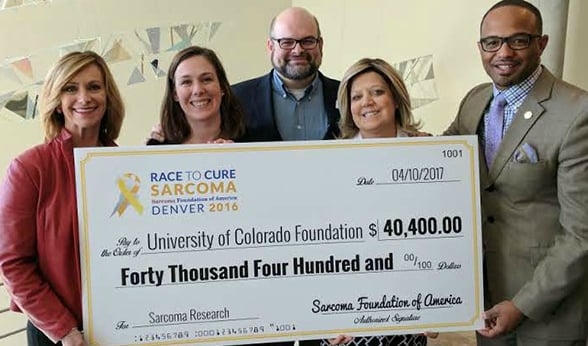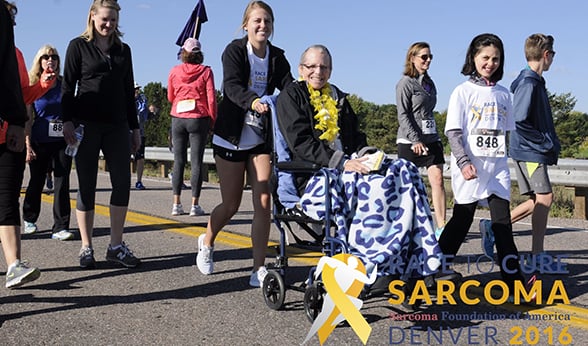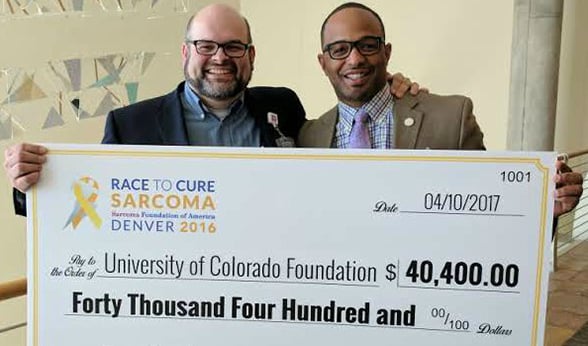For a debut event, last fall’s First Denver Race to Cure Sarcoma 5K Run/Walk proved a smashing success, attracting almost 600 participants and raising $110,000 for sarcoma research.
 Pictured at the check presentation at the CU Cancer Center are, from left, volunteer and sarcoma survivor Susan Rawley; Michaela Mueller, Sarcoma Foundation of America; Dr. Victor Villalobos, assistant professor, CU School of Medicine; volunteer and sarcoma survivor Toni Baltizar; and Albus Brooks, CU alumnus, sarcoma survivor and Denver City Council president. Photos by Erika Matich, CU Cancer Center.
Pictured at the check presentation at the CU Cancer Center are, from left, volunteer and sarcoma survivor Susan Rawley; Michaela Mueller, Sarcoma Foundation of America; Dr. Victor Villalobos, assistant professor, CU School of Medicine; volunteer and sarcoma survivor Toni Baltizar; and Albus Brooks, CU alumnus, sarcoma survivor and Denver City Council president. Photos by Erika Matich, CU Cancer Center.
“It was awesome – the turnout was huge,” said Victor Villalobos, MD, PhD, assistant professor, medicine-medical oncology, University of Colorado School of Medicine (SOM). “It also helped raise awareness. A lot of people have never heard of sarcoma before.”
On April 10, Villalobos, who is also director of Sarcoma Medical Oncology for the CU Cancer Center, joined run/walk Chairman Albus Brooks and two other local sarcoma survivors as well as Michaela Mueller, event manager of the Sarcoma Foundation of America (SFA), for a check presentation to the CU Cancer Center. The event proceeds were evenly split between CU and the SFA, minus administrative expenses and fees, leaving an award of $40,400 to the university.
The SFA organized three new fundraiser run/walks across the country last year, and Denver’s race, which got a late start being put together, ended up with the largest participation.
‘Great event’
“It was a great event,” said Brooks, who is president of the Denver City Council and a former CU Buffaloes linebacker. “For a last-minute race to raise over a hundred grand and have that many participants is truly remarkable. Now that we have an elongated time frame to plan for the next race (Sept. 16) we can really get after it.”
 Almost 600 participants took part in the First Denver Race to Cure Sarcoma 5K Run/Walk last September along Cherry Creek Dam Road.
Almost 600 participants took part in the First Denver Race to Cure Sarcoma 5K Run/Walk last September along Cherry Creek Dam Road.
Brooks got the shock of his life last summer when, after feeling pain in his lower back while running a couple road races, he went to his doctor. A 15-pound malignant tumor – chondrosarcoma – was found in his lower back. A CU Anschutz team, including Villalobos, Ana Gleisner, MD, PhD, assistant professor, surgical oncology, and Evalina Burger, MD, professor, orthopedics, treated Brooks, who said, “I’ve never had care like that. It was incredible.”
[perfectpullquote align="left" cite="" link="" color="" class="" size=""]'It’s nice for people to know they have a sarcoma clinic here.' – Toni Baltizar, sarcoma survivor[/perfectpullquote]
On July 5, Brooks underwent an eight-hour surgery at the University of Colorado Hospital, where the large tumor was removed by Gleisner.
Brooks and a couple other sarcoma survivors who helped organize the Denver Race to Cure Sarcoma – Toni Baltizar and Susan Rawley – praise the sarcoma expertise available through the CU Anschutz Medical Campus and the CU Cancer Center. “It’s nice for people to know they have a sarcoma clinic here rather than have to travel to MD Anderson Cancer Center (Houston) or Memorial Sloan Kettering Cancer Center (New York),” said Baltizar, who had a 10-pound tumor removed seven years ago.
Dedicated to new research
Rawley said that at this stage – she was diagnosed with a 3-pound sarcoma a year ago – “what I really need is someone like Dr. Villalobos, because he’s a scientist who is dedicated to doing new research and helping raise money for even more research.”
 Dr. Victor Villalobos, left, is part of the medical team that treated Denver City Council President Albus Brooks when a 15-pound tumor was found in his lower back last summer.
Dr. Victor Villalobos, left, is part of the medical team that treated Denver City Council President Albus Brooks when a 15-pound tumor was found in his lower back last summer.
Villalobos said events such as the Denver Race to Cure Sarcoma take on greater importance in today’s political climate. “There’s a possibility of losing more funding for scientific research,” he said. “So we have to look more toward charitable foundations and events like this to actually further the science. This helps us develop the science that it takes to get more funding.”
He said money raised through the race will help fund a couple clinical trials currently in development at the CU Cancer Center. The trials include a combination of targeted therapy and immunotherapy that could have applications for several types of sarcoma.
While there are 80 different types of sarcoma, Villalobos said, many share a genetic imprint that can be targeted with similar therapies.
He also hopes to work with the Sarcoma Alliance to strengthen peer support for patients. “That’s something I really want to accomplish. We need to develop a really good patient support network,” Villalobos said. “I think that’s probably one of the biggest things we’re lacking.”
